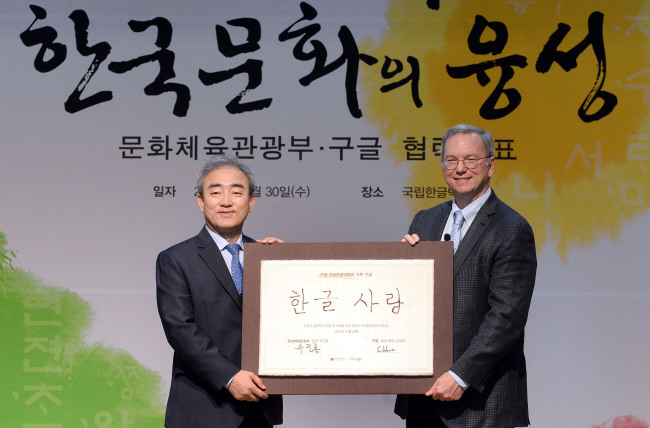
Culture Minister Yoo Jin-ryong (left) and Google Executive Chairman Eric Schmidt pose after a press briefing held at the Hangeul Museum in Seoul on Wednesday. (Ahn Hoon/The Korea Herald)
Google, the world’s most-visited website, will dedicate a section to Korean culture including traditional dress, architecture, film and Hangeul.
The internet giant will also support the development of a special program and space where children of multicultural families and foreigners can learn and understand the unique Korean writing system at the Hangeul Museum, which is slated to open in Seoul in 2014, the Ministry of Culture, Sports and Tourism and Google announced Wednesday at a joint press briefing.
“The Korean culture spans 5,000-6,000 years while Google is 15 years old. And as a respectful teenager, we have come up with the project,” said Eric Schmidt, the executive chairman of Google. “I understand that the writing system is more than a language. Though the language King Sejong (who promulgated Hangeul 567 years ago) used changed a lot, Hangeul is still the core to Korean culture. And our future goal is to share Korea’s rich culture with the world,” he said.
About 10,000 content sources, including the National Museum of Korea, Korean Art Museum Association and Korea Database Agency, will be made available to internet users around the world.
The Lee Young-Hee Museum of Korean Culture will start with a special exhibition introducing hanbok at
www.google.com/culturalinstitute. Hanok will also be featured with stories told by Cho San-ku, CEO of hanok accommodation provider, Kozaza. A total of 12 sections dedicated to Korean film will be featured with behind the scenes information and subtitles provided by Google Translate.
The plan announced Wednesday is an extension of a 2011 agreement which had Google establish a K-pop channel on its video website YouTube, hold online exhibitions of items at the National Museum and more. So far, six K-pop concerts have been streamed worldwide.
“Today, K-pop is everywhere, and even I had to learn how to dance ‘Gangnam Style,’” said Schmidt. He said that assuming 1 percent of those who enjoyed “Gangnam Style” wanted to learn about Korea would equal 18 million people, larger than the annual number of visitors to the Metropolitan Museum of Art in New York.
“Anyone who cares about Korea will be able to learn at the largest and easiest museum ― the internet,” he said.
Later in the day, the leader of one of the world’s most powerful companies continued gushing about his affection for Korea at the Big Tent Seoul 2013, a global conference hosted by Google. Under the theme of “Culture and Internet,” a group of panelists consisting of policy makers, cultural content developers and businessmen discussed how Korea could boost development of cultural content and its global distribution by harnessing the internet.
“Korea has more than 90 percent internet connectivity, which is amazing. And you can download 160 megabits per second. There is not a single person saying that the internet will stop or they do not want to be connected to each other. And Korea is very well connected to each other,” he said, adding that the future is bright for export of Korean culture and developing creative culture content.
He noted that what is really needed in the Korean cultural circle is a little more openness that embraces diversity.
“I see that Korea is more hierarchical and paternalistic and top-down. But what we must understand is that creativity comes from bottom-up environment. Capturing that will definitely boost creativity,” he said.
“Who knows? Somewhere out in a small village there may be a little child who would eventually become something more than Psy or anyone else!” he said.
By Bae Ji-sook
(
baejisook@heraldcorp.com)




![[KH Explains] No more 'Michael' at Kakao Games](http://res.heraldm.com/phpwas/restmb_idxmake.php?idx=645&simg=/content/image/2024/04/28/20240428050183_0.jpg&u=20240428180321)

